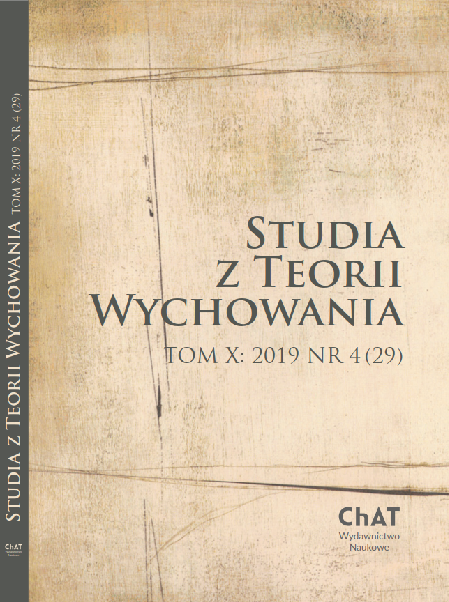Czy istnieje tutoring rówieśniczy w przedszkolu? Rozważania wokół znaczenia pojęcia tutoringu
Does peer tutoring in kindergarten exist? Thinking around the tutoring concept
Author(s): Aneta Babiuk-MassalskaSubject(s): Social Sciences, Education, Preschool education, School education
Published by: Wydawnictwo Naukowe ChAT
Keywords: peer tutoring; peer assisted learning; peer education; little teacher; kindergarten
Summary/Abstract: The article reviews the definitions of the tutoring concept in preschoolers relationships. Can we qualify the relationships of preschool children in learning situations as tutoring? Or maybe a different name would be more suitable for them?Preschoolers are used to learning in a diff erent way than adults and older children. They prefer learning mimicking or playing. They obtain knowldge occasionally an unintentionally. In turn, definitions of tutoring quite precisely contain formulated fortifications that a little child is not able to meet yet. Immaturity of the nervous system limit the level and length of attention span of little child and relatively small, compared to school children and adults number of social experiences can seriously hamper the classification of situations in which children learn from each other as tutoring. While the generally understood master-student relationship, associated with tutoring, is quite often noticeable during childhood collaboration and play in which one child can do more than the other, the more detailed assumptions of tutoring are not as accessible to the observer. For example, it is difficult to talk about the regularity or planned nature of children’s relationships. The definition of tutoring also sets specific expectations regarding the teacher’s skills, among which are: high interpersonal competences, commitment to the relationship with the mentee, professionalism and responsibility. From a preschool child who would play the role of a teacher, it is difficult to demand fluent speech, not to mention professionalism and regularity. A preschool child, who just start to learn numbers, is often unable to orient himself in time, which makes it difficult or even impossible to plan and systematize his activities. Little child needs adult help in this area.
Journal: Studia z Teorii Wychowania
- Issue Year: X/2019
- Issue No: 4 (29)
- Page Range: 63-84
- Page Count: 22
- Language: Polish

